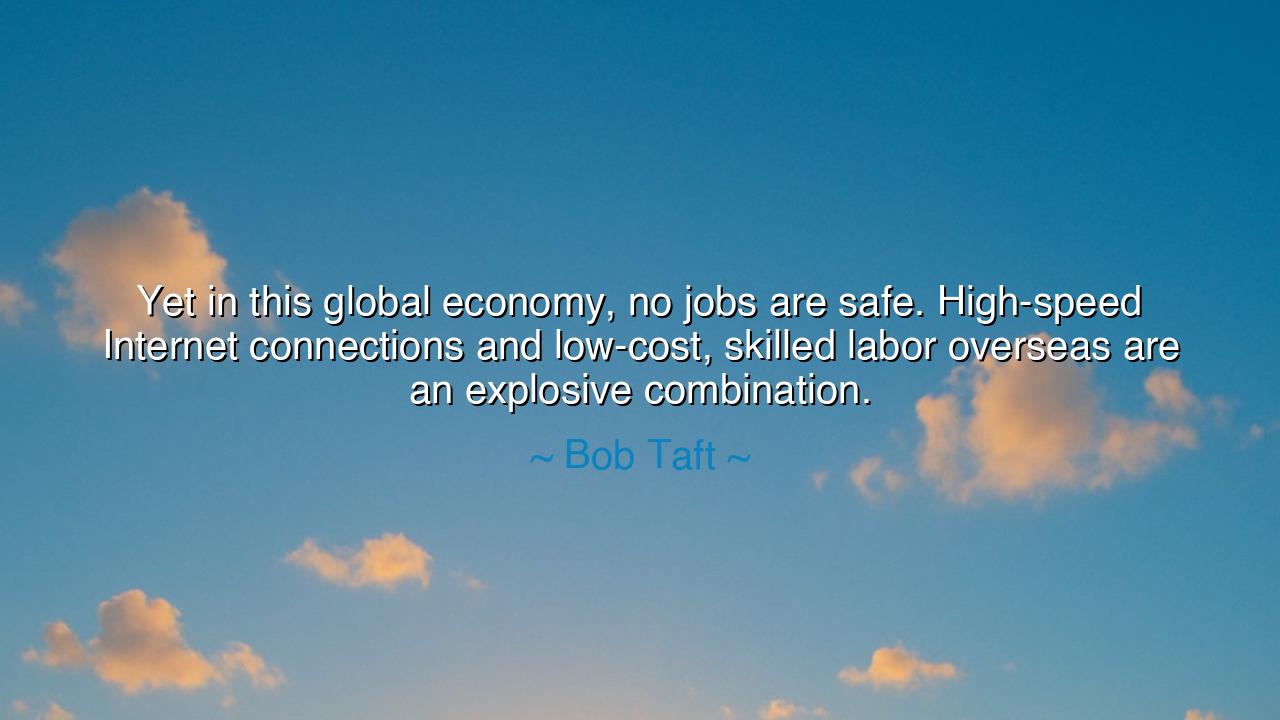
Yet in this global economy, no jobs are safe. High-speed Internet
Yet in this global economy, no jobs are safe. High-speed Internet connections and low-cost, skilled labor overseas are an explosive combination.






In the vast expanse of human history, one constant has been the pursuit of stability and security through labor. Work, the act of dedicating oneself to a task, has often been seen as the foundation of a secure life. Yet, as Bob Taft wisely states, "Yet in this global economy, no jobs are safe." This truth, though unsettling, reflects the profound changes wrought by time and technology. In the ancient world, empires rose and fell on the strength of armies, trade routes, and the labor of their people. But today, the very nature of work is shifting beneath our feet, no longer bound by geography or physical barriers. The walls that once kept our professions in place are crumbling before the winds of globalization and technological advancement.
The combination of high-speed Internet and low-cost, skilled labor overseas is a force so powerful that it shakes the foundations of traditional employment. Imagine a mighty river flowing through a valley, carving new paths where none existed before. Similarly, the currents of technology and international markets are reshaping the terrain of work, creating opportunities where there were none, but also sweeping away the familiar shores of security. As Taft warns, these forces are an explosive combination, threatening the stability of industries and professions once thought invulnerable. The winds of change blow ever stronger, and only those who understand their force will survive.
This truth is not new. Long before the internet, there were great disruptions that transformed the nature of labor. Consider the rise of the Industrial Revolution in the 18th century. Before steam engines and mechanized looms, weaving was a craft passed down through generations, a secure livelihood for many. Yet, when the machines came, they uprooted entire communities of skilled workers, replacing their delicate hands with the cold efficiency of metal. The workers who adapted to these new technologies thrived, while those who clung to the past were left behind. This is the timeless lesson: change is inevitable, and those who fail to adapt are at risk of being swept away.
Today, we stand at the dawn of a similar revolution. High-speed internet, the very fabric of the modern world, has connected the farthest reaches of the earth, enabling work to be done anywhere, by anyone, at any time. And yet, this connection, though powerful, carries a heavy cost. For in its wake, jobs once reserved for those in developed nations are now being performed by skilled workers in distant lands, where the cost of living is far lower. This is the new reality, where borders no longer define labor, and where the competition is global. It is a lesson that echoes the rise and fall of great civilizations: what once seemed secure can vanish overnight.
To illustrate this truth, let us consider the rise of outsourcing in the late 20th century. As corporations sought to reduce costs, they turned to countries with lower labor costs, sending jobs that once thrived in developed nations to the other side of the world. Companies in India, China, and other emerging markets became the new hubs of skilled labor, as people in these regions offered their talents for a fraction of the cost. The combination of affordable technology and skilled workers has led to a profound shift in the balance of power, where the stronghold of established economies is now being eroded by forces far beyond their control. The lesson is clear: no matter how established a profession may seem, it is vulnerable to the forces of globalization and technological change.
From this, we glean a critical lesson: the only constant in this world is change. The future of work will not be shaped by the certainties of the past, but by adaptability and innovation. Those who resist the tide of progress may find themselves lost in its wake, while those who embrace the new opportunities it brings will ride the wave to success. Skill, once confined by geography, is now available to anyone with the will to learn. The rise of online learning, freelancing, and remote work means that the opportunities to thrive are now limitless, but so too are the threats.
Thus, the wise among us must prepare not just for the work of today, but for the uncertain future that looms ahead. This is a call to action, to adapt and evolve, to learn new skills, and to seek out opportunities in this vast, interconnected world. The future of work belongs to those who dare to innovate, to embrace the unknown, and to thrive in a world where no job is truly safe. The path ahead may not be easy, but it is full of opportunity for those who are ready to seize it.






AAdministratorAdministrator
Welcome, honored guests. Please leave a comment, we will respond soon